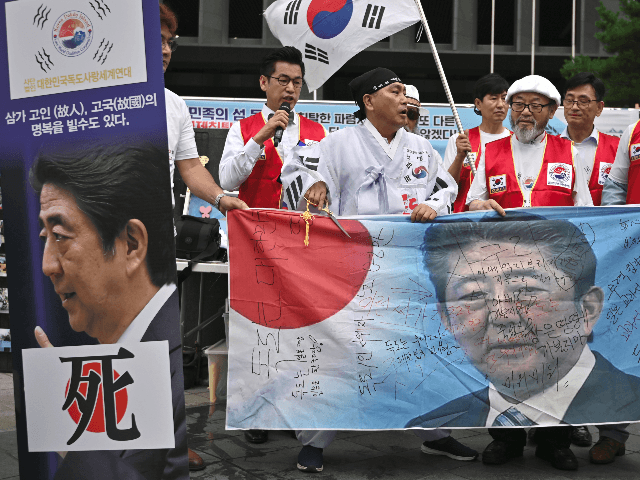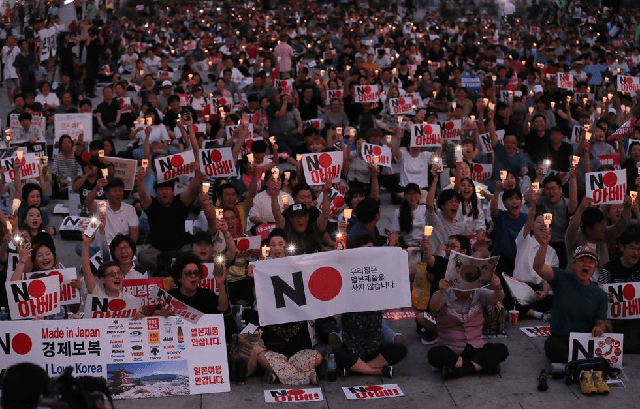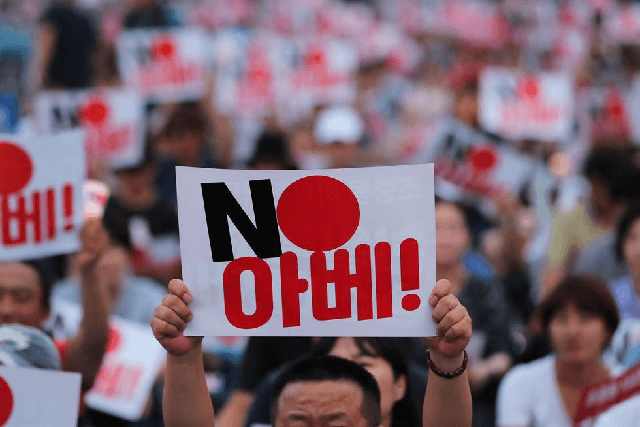Thousands of South Koreans rallied in Seoul on Saturday night, carrying banners that read “No Abe!” and “Apologize for forced labor!”
The demonstrators were protesting against Japanese Prime Minister Abe Shinzo’s trade restrictions against South Korea and spotlighting the century-old dispute over Imperial Japan’s use of forced labor in Korea that underlies the current economic and diplomatic crisis. China is watching the conflict carefully, nervous about the regional economic disruption but perhaps seeing an opportunity to isolate Japan and build stronger ties with South Korea.
Long-simmering tensions between Japan and South Korea exploded at the beginning of July, when Japan imposed restrictions on the export of chemicals crucial to electronics manufacturing to South Korea. Japan accused South Korean firms of allowing these chemicals to be illegally shipped to North Korea.
The Japanese action was, in turn, widely seen by Koreans as retaliation for the South Korean Supreme Court ordering the seizure of Japanese corporate assets because the company refused to pay reparations for using forced labor during Japan’s occupation of Korea in the World War II era.
Relations between the two countries deteriorated throughout July, culminating in this weekend’s Seoul demonstration and a growing boycott of Japanese goods by South Korean companies and consumers.
The Korea Times quoted participants in the Seoul rally who stressed their quarrel is with the Japanese government, not the people of Japan. A common theme in their complaints was Japanese Prime Minister Abe’s alleged interest in reviving Japanese “militarism.”
“We are not here to hate Japanese people. We are here to talk about justice. What Abe is doing is militarism and it is our responsibility to fight for world peace,” one demonstrator told the Korea Times.
Another spoke of the boycott against Japanese goods as “an objection to Abe’s dream of reviving militarism without a proper reflection on the atrocities Japan committed.”
Yonhap News provided photos of the Saturday evening march past Japan’s embassy in Seoul that highlighted how South Koreans are directing their ire at Abe personally:
Japanese beer was among the first products hit by the South Korean boycott movement. Several South Korean retailers announced over the weekend that they are cutting their orders for imported Japanese beer because demand for the products has collapsed. One South Korean convenience store chain pointedly excluded Japanese beer from a discount event it has been running, citing “negative public sentiment toward Japan.”
South Korean retailers are rolling out “patriotic marketing” campaigns for the Liberation Day holiday on August 15, which celebrates South Korea’s liberation from Japanese colonial rule in 1945. Some of this marketing is tied to the release of a movie about South Korean freedom fighters called The Battle: Roar to Victory that will be released a week before the holiday. The marketing campaign and movie were planned long before the current dispute between Japan and South Korea, but retailers have hinted they intend to go deeper into “patriotic marketing” as public anger builds against the Japanese government.
The big winner in the feud between Japan and South Korea is China. The Chinese government has been fairly circumspect about making official statements that would drag Beijing into the battle, but China’s tightly controlled media have been running articles supportive of South Korea and critical of Japan.
For example, the Global Times editorialized in early July that Abe imposed the controversial export controls to “pander to Japanese public opinion,” where “anti-Korean sentiment is running high.”
The Global Times slammed Japan for its position on World War II forced labor, accusing Abe’s government of ignoring “the objective treatment of history” and using economic sanctions to “retaliate against judicial decisions” in South Korea.
This was followed by dark ruminations that unnamed foreign powers were responsible for ratcheting up tensions in the region and disrupting China’s improving relations with both Japan and South Korea by taking provocative actions such as “trade protectionism” and installing advanced missile defenses in South Korea.
Another Global Times editorial later in July sneered at the United States for becoming a mere “onlooker” in the spat between its allies Japan and South Korea, in part because both countries have grown more “independent” from the United States thanks to their growing economic ties with China.
South Korean warnings about the return of Japanese “militarism” under Abe echo longstanding Chinese allegations that Abe wants to beef up Japan’s military and revise its pacifist constitution because Abe harbors dreams of restoring the Empire of the Rising Sun or wants to pander to Japanese voters who feel nostalgic for it.
The real reason for these complaints is that China wants to prevent the Japanese military from challenging its control of disputed islands, but as in South Korea, there is no shortage of lingering Chinese resentment for the depredations of Imperial Japan and the reluctance of modern Japanese officials to apologize for them.
China sees Japan as a much more intransigent regional adversary than South Korea, where Beijing sees opportunities to make inroads through trade and cultural initiatives, especially if North Korea’s economy opens up.
During the first half of this decade, Japan saw itself forging a stronger relationship with South Korea to oppose China’s hegemonic influence, but those plans went awry with the election of President Moon, who prioritized improving relations with North Korea (and by extension China) and moved forced labor back to the front burner, reversing efforts by his predecessor Park Geun-hye to settle the issue. Japan may be hoping the new trade war with South Korea weakens Moon, whose popularity has been slipping after euphoric highs achieved during the diplomatic thaw with North Korea.
Japan is reportedly unfazed by South Korean protests and intends to impose even stricter export controls by the end of August. These controls would compel Japanese exporters to obtain licenses before selling a wide range of products to South Korea, on the grounds that South Korea has undermined the “relationship of trust” between the two countries, as the Japanese Trade Ministry put it.
Japanese media reported on Monday that Prime Minister Abe is “unlikely” to meet with South Korean President Moon Jae-in on the sidelines of the United Nations General Assembly in September, or at the Association of Southeast Asian Nations (ASEAN) or Asia-Pacific Economic Cooperation (APEC) meetings in October or November, respectively. The sources for these reports said Abe will not meet with Moon until South Korea takes “constructive steps” to end the impasse over forced labor and other issues.
South Korean officials have announced plans to ask ASEAN for help in striking down the new Japanese export restrictions, and have floated the idea of asking the United Nations to investigate Japan’s claims that South Korea violated sanctions against North Korea.



COMMENTS
Please let us know if you're having issues with commenting.